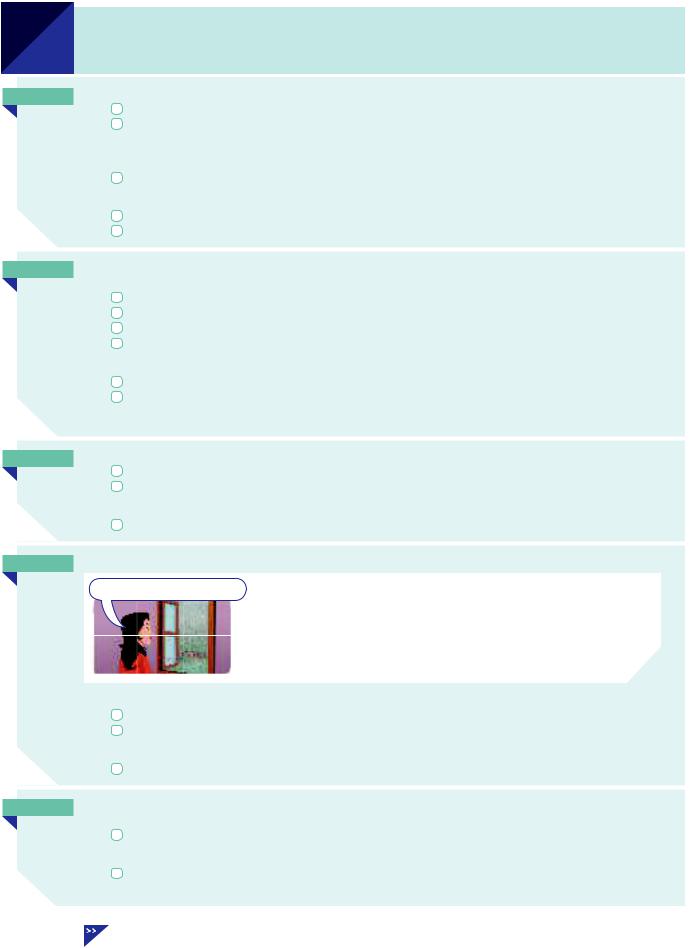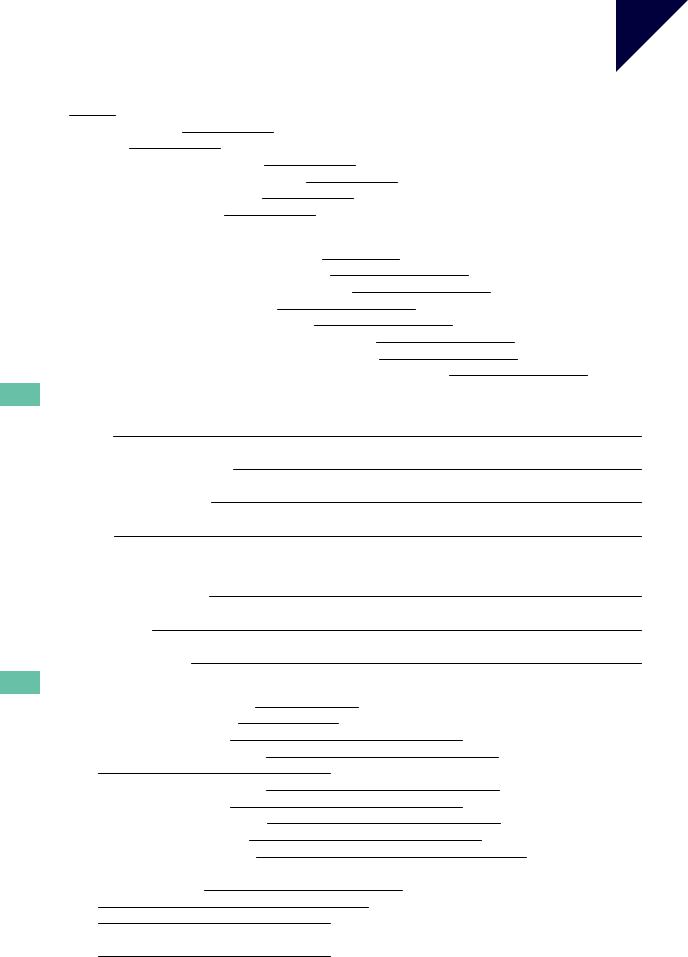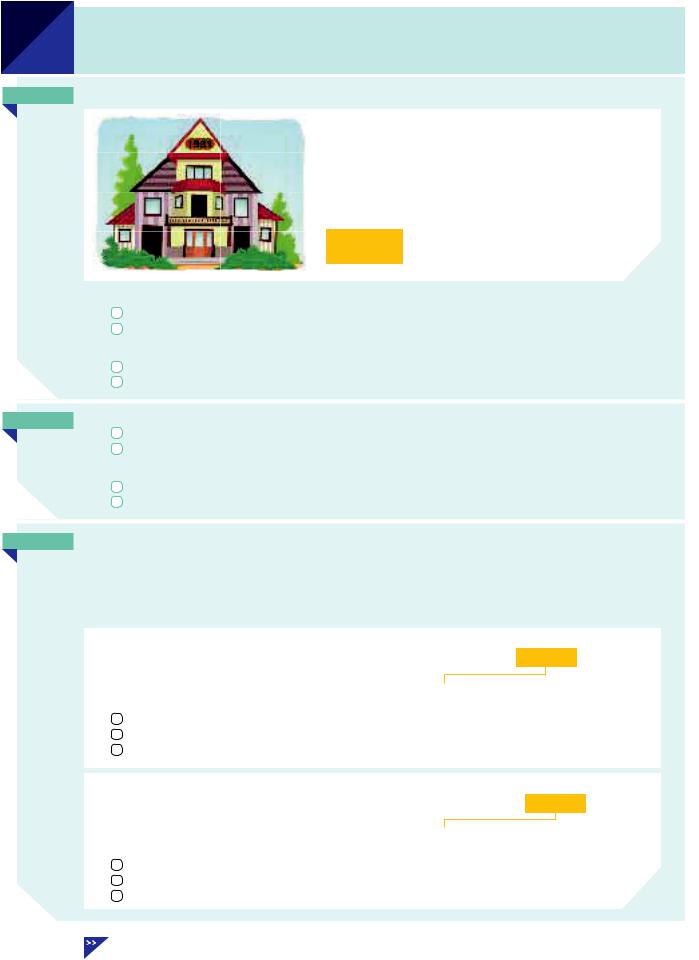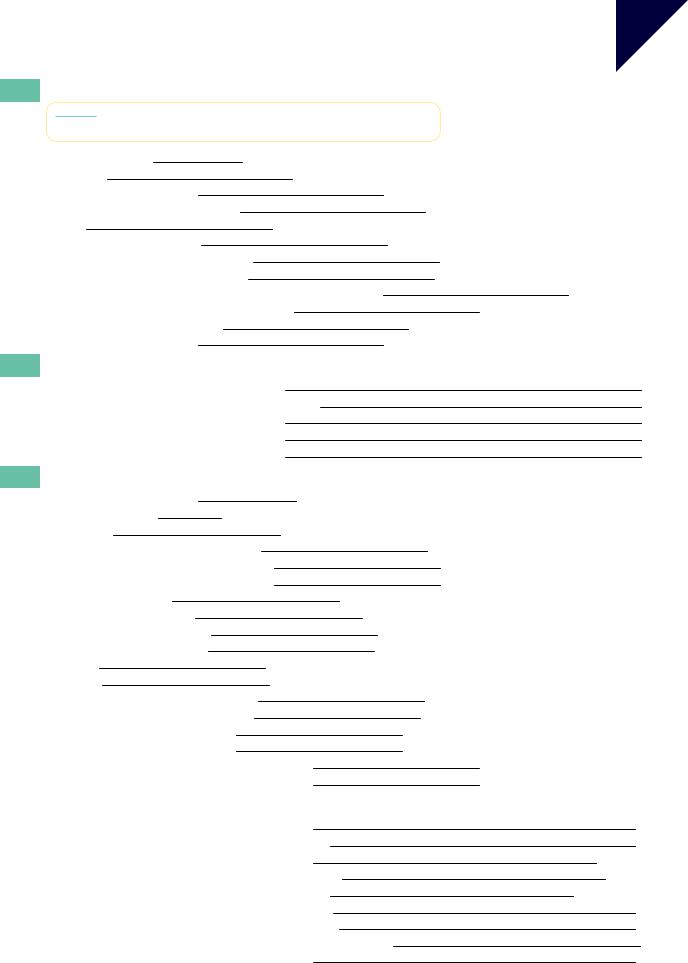
- •Contents
- •Thanks
- •To the student
- •To the teacher
- •3 Present continuous and present simple 1 (I am doing and I do)
- •10 Present perfect continuous and simple (I have been doing and I have done)
- •11 how long have you (been) … ?
- •12 for and since when … ? and how long … ?
- •13 Present perfect and past 1 (I have done and I did)
- •14 Present perfect and past 2 (I have done and I did)
- •15 Past perfect (I had done)
- •16 Past perfect continuous (I had been doing)
- •17 have and have got
- •18 used to (do)
- •19 Present tenses (I am doing / I do) for the future
- •20 I’m going to (do)
- •21 will and shall 1
- •22 will and shall 2
- •23 I will and I’m going to
- •24 will be doing and will have done
- •26 can, could and (be) able to
- •27 could (do) and could have (done)
- •28 must and can’t
- •29 may and might 1
- •30 may and might 2
- •31 have to and must
- •32 must mustn’t needn’t
- •33 should 1
- •34 should 2
- •35 I’d better … it’s time …
- •36 would
- •39 if I knew … I wish I knew …
- •40 if I had known … I wish I had known …
- •41 wish
- •42 Passive 1 (is done / was done)
- •43 Passive 2 (be done / been done / being done)
- •44 Passive 3
- •45 it is said that … he is said to … he is supposed to …
- •46 have something done
- •47 Reported speech 1 (he said that …)
- •48 Reported speech 2
- •49 Questions 1
- •52 Question tags (do you? isn’t it? etc.)
- •53 Verb + -ing (enjoy doing / stop doing etc.)
- •54 Verb + to … (decide to … / forget to … etc.)
- •55 Verb (+ object) + to … (I want you to …)
- •56 Verb + -ing or to … 1 (remember, regret etc.)
- •57 Verb + -ing or to … 2 (try, need, help)
- •58 Verb + -ing or to … 3 (like / would like etc.)
- •59 prefer and would rather
- •60 Preposition (in/for/about etc.) + -ing
- •61 be/get used to … (I’m used to …)
- •63 there’s no point in -ing, it’s worth -ing etc.
- •64 to … , for … and so that …
- •65 Adjective + to …
- •66 to … (afraid to do) and preposition + -ing (afraid of -ing)
- •67 see somebody do and see somebody doing
- •68 -ing clauses (He hurt his knee playing football.)
- •69 Countable and uncountable 1
- •70 Countable and uncountable 2
- •71 Countable nouns with a/an and some
- •74 the 2 (school / the school etc.)
- •75 the 3 (children / the children)
- •77 Names with and without the 1
- •78 Names with and without the 2
- •79 Singular and plural
- •80 Noun + noun (a bus driver / a headache)
- •81 -’s (your sister’s name) and of … (the name of the book)
- •82 myself/yourself/themselves etc.
- •83 a friend of mine my own house on my own / by myself
- •84 there … and it …
- •85 some and any
- •87 much, many, little, few, a lot, plenty
- •90 all every whole
- •91 each and every
- •92 Relative clauses 1: clauses with who/that/which
- •94 Relative clauses 3: whose/whom/where
- •95 Relative clauses 4: extra information clauses (1)
- •96 Relative clauses 5: extra information clauses (2)
- •97 -ing and -ed clauses (the woman talking to Tom, the boy injured in the accident)
- •98 Adjectives ending in -ing and -ed (boring/bored etc.)
- •99 Adjectives: a nice new house, you look tired
- •100 Adjectives and adverbs 1 (quick/quickly)
- •102 so and such
- •104 quite, pretty, rather and fairly
- •105 Comparative 1 (cheaper, more expensive etc.)
- •106 Comparative 2 (much better / any better etc.)
- •107 Comparative 3 (as … as / than)
- •108 Superlative (the longest / the most enjoyable etc.)
- •109 Word order 1: verb + object; place and time
- •110 Word order 2: adverbs with the verb
- •111 still any more yet already
- •112 even
- •114 in case
- •116 as (as I walked … / as I was … etc.)
- •117 like and as
- •119 during for while
- •121 at/on/in (time)
- •122 on time and in time at the end and in the end
- •123 in/at/on (position) 1
- •124 in/at/on (position) 2
- •125 in/at/on (position) 3
- •126 to, at, in and into
- •127 in/on/at (other uses)
- •129 Noun + preposition (reason for, cause of etc.)
- •130 Adjective + preposition 1
- •131 Adjective + preposition 2
- •132 Verb + preposition 1 to and at
- •134 Verb + preposition 3 about and of
- •135 Verb + preposition 4 of/for/from/on
- •136 Verb + preposition 5 in/into/with/to/on
- •137 Phrasal verbs 1 Introduction
- •138 Phrasal verbs 2 in/out
- •139 Phrasal verbs 3 out
- •142 Phrasal verbs 6 up/down
- •143 Phrasal verbs 7 up (1)
- •144 Phrasal verbs 8 up (2)
- •145 Phrasal verbs 9 away/back
- •Additional exercises
- •Study guide
- •Key to Exercises
- •Key to Additional exercises (see page 302)
- •Key to Study guide
- •Index

Unit
41 wish
AWe say ‘wish somebody luck / all the best / success’ etc. :
I wish you all the best in the future.
I saw Mark before the exam and he wished me luck.
We say ‘wish somebody something’ (luck, happiness etc.), but we do not say ‘I wish something happens’. We use hope in this situation:
I’m sorry you’re not well. I hope you feel better soon. (not I wish you feel)
Compare I wish and I hope:
I wish you a pleasant stay at this hotel.
I hope you enjoy your stay at this hotel. (not I wish you enjoy)
BWe also use wish to say that we regret something, that something is not as we would like it.
When we use wish in this way, we use the past (knew/lived etc.), but the meaning is present:
I wish I knew what to do about the problem. (but I don’t know)
I wish you didn’t have to go so soon. (but you have to go)
Do you wish you lived near the sea? (you don’t live near the sea)
Jack’s going on a trip to Mexico soon. I wish I was going too. (but I’m not going)
To say that we regret something that happened before, we use wish + had known / had said etc. :
I wish I’d known about the party. I’d have gone if I’d known. (but I didn’t know) It was a stupid thing to say. I wish I hadn’t said it. (but I said it)
See also Units 39 and 40.
CI wish I could (do something) = I regret that I cannot do it:
I’m sorry you have to go. I wish you could stay longer. (but you can’t)
I’ve met that man before. I wish I could remember his name. (but I can’t)
I wish I could have (done something) = I regret that I could not do it:
I hear the party was great. I wish I could have gone. (but I couldn’t go)
DYou can say ‘I wish something would happen’. For example:
I wish it would stop raining. It’s been raining all day. Tanya doesn’t like it. She says:
I wish it would stop raining.
Tanya would like the rain to stop, but this will probably not happen.
We use I wish … would when we would like something to happen or change.
We oten use I wish … would to complain about a situation:
The phone has been ringing for five minutes. I wish somebody would answer it.
I wish you’d do (= you would do) something instead of just sitting and doing nothing.
You can use I wish … wouldn’t … to complain about things that people do repeatedly: I wish you wouldn’t keep interrupting me. (= please stop interrupting me)
EWe use I wish … would … to say that we want something to happen. We do not use I wish … would …
to say how we would like things to be. Compare:
I wish Sarah would come. (= I want her to come)
but I wish Sarah was (or were) here now. (not I wish Sarah would be)
I wish somebody would buy me a car. but I wish I had a car. (not I wish I would have)
|
would Unit 36 I wish I knew Unit 39 I wish I was / I wish I were Unit 39C |
82 |
I wish I had known Unit 40 |

Exercises |
|
|
|
|
Unit |
||
|
|
|
|
41 |
|||
|
|
|
|
|
|
|
|
|
|
|
|
|
|
||
41.1 |
Put in wish(ed) or hope(d). |
|
|
|
|
|
|
1 |
I wish you a pleasant stay at this hotel. |
|
|
|
|
||
2 |
Enjoy your holiday. I |
you have a great time. |
|
|
|
||
3 |
Goodbye. I |
you all the best for the future. |
|
|
|
||
4 |
We said goodbye to each other and |
each other luck. |
|
|
|||
5 |
We’re going to have a picnic tomorrow, so I |
|
the weather is nice. |
|
|
||
6 |
Congratulations on your new job. I |
you every success. |
|
|
|||
7 |
Good luck in your new job. I |
|
it works out well for you. |
|
|
||
|
|
|
|
|
|
||
41.2 |
Complete the sentences. |
|
|
|
|
|
|
1 |
Jack is going on a trip to Mexico soon. I wish I |
was going |
too. |
|
|
||
2 |
I’m very tired and I have so much to do. I wish I |
so tired. |
|
|
|||
3 |
You didn’t tell me you were ill. Why not? I wish you |
me. |
|
|
|||
4 |
I don’t have enough free time. I wish I |
|
more free time. |
|
|
||
5 |
I can’t make up my mind what to do. I wish I |
|
decide. |
|
|
||
6 |
I bought these shoes, but now I don’t like them. I wish I |
|
them. |
||||
7 |
We have to go out now and I don’t want to go. I wish we |
|
to go out now. |
||||
8 |
Unfortunately I couldn’t go to the wedding last month. I wish I could |
. |
|
||||
41.3 What do you say in these situations? Write sentences with I wish … would … .
1 It’s raining. You want to go out, but not in the rain. You say: I wish it would stop raining.
2You’re waiting for Jane. She’s late and you’re getting impatient. You say to yourself: I wish she
3You’re looking for a job – so far without success. Nobody will give you a job. You say: I wish somebody
4You can hear a dog barking. It’s been barking a long time and you’re trying to study. You say:
For the following situations, write sentences with I wish … wouldn’t … .
5Your friend is driving very fast. She always drives fast and you don’t like this. You say to her: I wish you
6Joe leaves the door open all the time. This annoys you. You say to Joe:
7A lot of people drop litter in the street. You don’t like this. You say: I wish people
41.4Put the verb into the correct form.
1 |
It was a stupid thing to say. I wish I hadn’t said it. (I / not / say) |
|
2 |
I’m fed up with this rain. I wish it would stop |
. (it / stop) |
3 |
It’s a dificult question. I wish |
the answer. (I / know) |
4 |
I really didn’t enjoy the party. I wish |
. (we / not / go) |
5 |
I wish |
. We’ve been waiting for 20 minutes. (the bus / come) |
6 |
You’re lucky to be going away. I wish |
with you. (I / can / come) |
7 |
Our flat is rather small. I wish |
a bit bigger. (it / be) |
8 |
I should have listened to you. I wish |
your advice. (I / take) |
9 |
You keep interrupting me! I wish |
. (you / listen) |
10 |
You’re always complaining. I wish |
all the time. |
|
(you / not / complain) |
|
11 |
It’s freezing today. I wish |
so cold. I hate cold weather. (it / not / be) |
12 |
I wish |
. It’s horrible! (the weather / change) |
13 |
I wish |
a piano. I’d love to have one. (I / have) |
14 |
When we were in London last year, we didn’t have time to see all the things we wanted to see. |
|
|
I wish |
there longer. (we / can / stay) |
83

Unit
42 Passive 1 (is done / was done)
AStudy this example:
This house was built in 1981. ‘This house was built’ is passive. Compare active and passive:
Somebody built |
this house |
in 1981. (active) |
||
subject |
object |
|
||
|
|
|
|
|
|
|
|
|
|
This house was built in 1981. (passive) subject
When we use an active verb, we say what the subject does:
My grandfather was a builder. He built this house in 1981.
It’s a big company. It employs two hundred people.
When we use a passive verb, we say what happens to the subject:
‘How old is this house?’ ‘It was built in 1981.’
Two hundred people are employed by the company.
BWhen we use the passive, who or what causes the action is oten unknown or unimportant:
A lot of money was stolen in the robbery. (somebody stole it, but we don’t know who)
Is this room cleaned every day? (does somebody clean it? – it’s not important who)
If we want to say who does or what causes the action, we use by:
This house was built by my grandfather.
Two hundred people are employed by the company.
CThe passive is be (is/was etc.) + past participle (done/cleaned/seen etc.):
(be) done |
(be) cleaned |
(be) damaged |
(be) built |
(be) seen etc. |
The past participle oten ends in -ed (cleaned/damaged etc.), but many important verbs are irregular (built/done/stolen etc.). See Appendix 1.
Compare active and passive, present simple and past simple:
Present simple
Somebody cleans this room every day.
active: clean(s) / see(s) etc.
passive: am/is/are + cleaned/seen etc. |
This room |
is cleaned every day. |
Many accidents are caused by careless driving.
I’m not invited to parties very oten.
How is this word pronounced?
Past simple
Somebody cleaned this room yesterday.
active: cleaned/saw etc.
passive: was/were + cleaned/seen etc. |
This room |
was cleaned yesterday. |
|
|
|
We were woken up by a loud noise during the night. |
||
‘Did you go to the party?’ ‘No, I wasn’t invited.’ |
|
|
How much money was stolen in the robbery? |
|
|
84 |
Passive 2–3 Units 43–44 by Unit 128 |

Exercises |
Unit |
42 |
|
|
|
42.1 Complete the sentences. Use these verbs in the correct form, present or past:
|
cause |
damage |
find |
hold |
injure |
invite |
|
|
make |
overtake |
own |
send |
show |
surround |
|
1 |
Many accidents are caused by careless driving. |
|
|
||||
2 |
Cheese |
|
|
|
from milk. |
|
|
3 |
The roof of the building |
|
|
|
in a storm a few days ago. |
|
|
4 |
A cinema is a place where films |
|
|
. |
|
||
5 |
You |
|
|
to the party. Why didn’t you go? |
|
||
6 |
This plant is very rare. It |
|
|
|
in very few places. |
|
|
7 |
Although we were driving fast, we |
|
|
by a lot of other cars. |
|
||
8 |
In the US, elections for president |
|
|
every four years. |
|
||
9 |
There was an accident last night, but fortunately nobody |
. |
|||||
10 |
You can’t see the house from the road. It |
|
by trees. |
|
|||
11 |
I never received the letter. It |
|
|
to the wrong address. |
|
||
12 |
The company I work for |
|
|
|
by a much larger company. |
|
|
42.2 Write questions using the passive. Some are present and some are past.
1 Ask about glass. (how / make?) |
How is glass made? |
2 Ask about television. (when / invent?) When
3 Ask about mountains. (how / form?)
4 Ask about DNA. (when / discover?)
5 Ask about silver. (what / use for?)
42.3Put the verb into the correct form, present or past, active or passive.
1 |
a Two hundred people are employed (employ) by the company. |
|
|||
|
|
b The company employs |
(employ) 200 people. |
|
|
2 |
a Water |
(cover) most of the earth’s surface. |
|
||
|
|
b How much of the earth’s surface |
(cover) by water? |
|
|
3 |
a While I was on holiday, my camera |
(steal) from my hotel room. |
|||
|
|
b While I was on holiday, my camera |
(disappear) from my hotel room. |
||
4 |
a Robert’s parents |
|
(die) when he was very young. |
|
|
|
|
b Robert and his sister |
|
(bring up) by their grandparents. |
|
5 |
a The boat hit a rock and |
|
(sink) quickly. |
|
|
|
|
b Fortunately everybody |
|
(rescue). |
|
6 |
a Bill |
(fire) from his job. He wasn’t very good at it. |
|
||
|
|
b Sue |
(resign) from her job because she didn’t enjoy it any more. |
||
7 |
a It can be noisy living here, but it |
(not / bother) me. |
|
||
|
|
b It can be noisy living here, but I |
(not / bother) by it. |
|
|
8 |
a Maria had an accident. She |
(knock) of her bike. |
|
||
|
|
b Maria had an accident. She |
(fall) of her bike. |
|
|
9 |
a I haven’t seen these flowers before. What |
(they / call)? |
|
||
|
|
b I haven’t seen these flowers before. What |
(you / call) them? |
||
|
|
||||
42.4 |
Instead of using somebody, they, people etc., write a passive sentence. |
|
|||
1 |
Somebody cleans the room every day. |
The room is cleaned every day |
. |
||
2 |
They cancelled all flights because of fog. |
All |
. |
||
3 |
Somebody accused me of stealing money. |
|
money. |
||
4 |
How do you use this word? |
|
How |
used? |
|
5 |
The price includes all taxes. |
|
All |
in the price. |
|
6 |
People warned us not to go out alone. |
We |
. |
||
7 |
We don’t use this ofice any more. |
This |
. |
||
8 |
They invited five hundred people to the |
Five hundred |
|
||
|
|
wedding. |
|
|
. |
85
